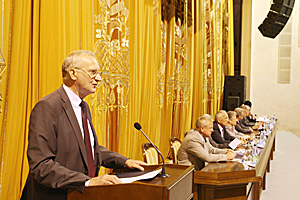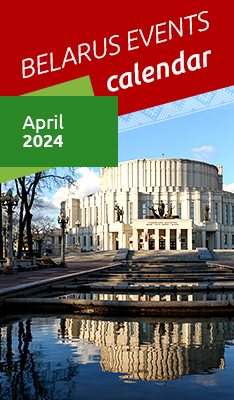Opinions & Interviews
Gusakov: Slavic culture in Belarus at a very high level

MINSK, 21 August (BelTA) - Slavic culture in Belarus is at a very high level, Deputy Chairman of the Presidium of the National Academy of Sciences of Belarus, the Chairman of the Organizing Committee of the 15th International Congress of Slavists Vladimir Gusakov told media on 21 August.
“The Congress of Slavists is a significant event not only for Belarus, which is this year’s host, but for all countries of the Slavic community. Belarus has been thoroughly preparing for the event. Slavic culture in our country is at a very high level, and the congress delegates will be able to see this, get acquainted with our rich historical culture, great cultural heritage that we carefully preserve and develop. We have something to bring to the attention of our colleagues,” Vladimir Gusakov said.
According to the scientist, holding the Congress of Slavists in Belarus can be viewed as a recognition of the development level of the Belarusian national slavistics, the role of the Belarusian language and literature in the Slavic culture. “It is great that Belarusian scholars make a huge contribution to the development of the world and national slavistics,” Vladimir Gusakov noted.
The congress will run through 27 August. Partaking in the forum will be over 600 scientists from Austria, Australia, Belgium, Belarus, Bulgaria, Germany, Israel, Italy, Spain, Canada, Lithuania, Russia, France, Switzerland, Japan and other countries.
The official opening ceremony of the forum took place at the Minsk Concert Hall on 21 August. The main scientific part of the forum will be held at the Minsk State Linguistic University from 22 to 26 August. It will comprise plenary and sectional reports, roundtables, meetings of special commissions accredited in the International Committee of Slavists.
Besides, the Minsk State Linguistic University will host an exhibition of Slavic literature published in different countries over the past five years. The expo will open on 22 August.
Slavic studies developed into an independent scientific field at the late 18th-early 19th centuries. Modern slavistics unites a whole range of human sciences that study languages, material and intellectual culture, origins, history, folklore and the literature of ancient and contemporary Slavists.
International Congresses of Slavists are large scientific forums dedicated to the issues related to the development of Slavic languages, literature, cultures, folklore in their cooperation. The International Congress of Slavists is a quinquennial event dating back to 1929.
| Su | Mo | Tu | We | Th | Fr | Sa |
|---|---|---|---|---|---|---|







 print version
print version make home page
make home page add to bookmarks
add to bookmarks

